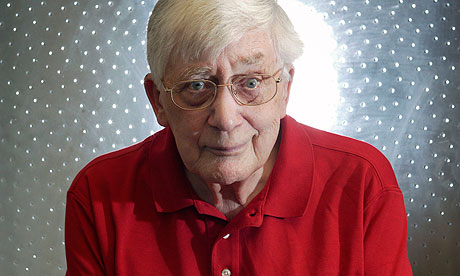
The mood of elegy does not have to be Gray. This week's poem laments the death of Basil Bunting (1900 -1985) while reflecting the versatile and playful spirit of its maker, Edwin Morgan, who died last week. "A Trace of Wings" is wholly characteristic of a poet who delighted in whirling the goodie bag of tradition and innovation, and so often magicked forth blends and mixtures never seen before.
With its strict, economical patterning, "A Trace of Wings" has something in common with Morgan's concrete poetry. Its structure might recall an old-fashioned sort of bird-book, with coloured pictures and friendly captions besides the more detailed and grammatically formal entry – the sort a child would enjoy. It's almost a crossword puzzle without the puzzle, the answers preceding a three-part cryptic clue.
These "clues" in turn suggest the Anglo-Saxon/ Old Norse kenning, reminding us that Morgan was a fine translator of Beowulf. The kenning, a metaphorical compound-word or phrase, is a descriptive stand-in for a noun. "The joy of the bird", for example, means the bird's feather, and "the dispenser of rings" is the prince. Anglo-Saxon listeners would be familiar with the metaphors, so "feather" and "prince" go unsaid. Morgan's poem borrows the technique, but also names the names.
The core-idea of the poet-as-songbird is hardly new. But it is expressed through such shining technical originality, and gathers round it so many other shared attributes, that the common metaphorical coin seems diamond-faceted.
Morgan's seven varieties of bunting bustle with birdy life. Conjured by swift phrases, they seem to flitter past as we watch, but leave indelible impressions of movement and colour. They are elusive: words like "shy", "perky", "scuttler", "darter" evoke their quick, barely visible movement. "Find him!", "What a whisk!" the speaker exclaims, surely glad that the birds are so fleet and wary. We catch, too, a moment of anger and fear when we reach the unfortunate Ortolan Bunting who "favours" (and flavours) gourmet tables, and has been hunted to near-extinction. The metaphorical associations continue to thicken. The poet might himself be an endangered species, like the ortolan, as well as a generous "grain-scatterer" like the corn-bunting. As a northerner, Basil Bunting could qualify, perhaps, as "blizzard-hardened." It seems fitting that the Snow Bunting is the last bird named before the poet himself appears.
"A Trace of Wings" is full of lovely sounds, and the stop-start rhythms leave room for savouring their effects. The longer closing line, in which the poem uncovers its true subject and occasion, introduces a mournful cadence. A rise and fall of lamentation, it climaxes with the sharp assonance of "prince of finches" and dies away with the monosyllables of the colloquial understatement, "gone from these parts."
Morgan was a writer who cared about a poem's visual impact as well as its sounds. The extra spacing between the bird-name and the "kennings", for instance, reflects the gulf between ornithological category and the elusive, living thing. Even the semi-colons seem to have a bird-like look, each a tiny pictogram of wing and eye.
In an essay in The Poet's Voice and Craft (edited by CB McCully, Carcanet, 1994) Morgan talks about the need for a poem to be both "deliberate" and "open". Particularly in some concrete poems, he says, "the danger would be that not enough space, not enough interstices, might be left for the spirit of inspiration to slip in". This poem is a beautiful example of how Morgan negotiates a disciplined structural arrangement without fencing off the places where "inspired accidents" occur. In fact the poem's very seed is an inspired accident – the fact that the superbly musical poet of Brigflatts should share his surname with a species of bird. It needed only a poet of Morgan's genius to notice – and whip up a miraculous, sparrow-quick elegy that is tender, funny, sorrowful, Anglo-Saxon-ish and modernist, mimetic and metaphorical, all at once – and all in eight lines. "What a whisk!" indeed.
"A Trace of Wings" appears in Edwin Morgan's Themes on a Variation (1988) and Collected Poems, and is reproduced here by kind permission of Carcanet. It's a poem to sweeten and sharpen our sorrow for two great makers, now "gone from these parts" but placeless, and timeless, in their bright plumage and full-voiced song.
A Trace of Wings
Corn Bunting shy but perky; haunts fields; grain-scatterer
Reed Bunting sedge-scuttler; swayer; a cool perch
Cirl Bunting small whistler; shrill early; find him!
Indigo Bunting blue darter; like metal; the sheen
Ortolan Bunting haunts gardens; is caught; favours tables
Painted Bunting gaudy flasher; red, blue, green; what a whisk!
Snow Bunting Arctic flyer; ghost-white; blizzard-hardened
Basil Bunting the sweetest singer; prince of finches; gone from
these parts







